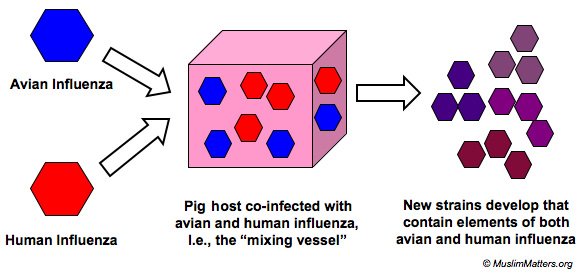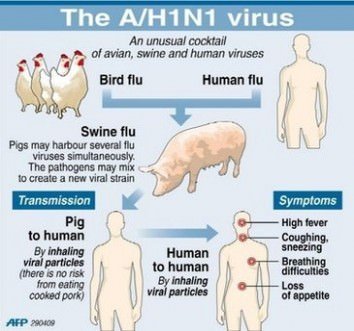“Forbidden to you (your food) are: dead meat, blood, the flesh of swine, and that on wish hath been invoked the name of other than Allah; that which hath been killed by strangling, or by a violent blow, or by a headlong fall, or by being gored to death; than which hath been (partly) eaten by a wild animal; unless ye are able to slaughter it (in due form); that which is sacrificed on stone (altars); (forbidden) also is the division (of meat) by raffling with arrows: that is impiety. This day have those who reject Faith given up all hope of your religion: yet fear them not but fear me. This day have I perfected your religion for you, completed my favour upon you, and have chosen for you Islam as your religion. But if any is forced by hunger, with no inclination transgression, Allah is indeed Oft-Forgiving, Most Merciful.” [5:3]
“Say: I find not in the message received by me by inspiration any (meat) forbidden to be eaten by one who wishes to eat it, unless it be dead meat, or blood poured forth, or the flesh of swine, for it is an abomination or, what is impious, (meat) on which a name has been invoked, other than Allah’s. But (even so), if a person is forced by necessity, without wilful disobedience, nor transgressing due limits, thy Lord is Oft-Forgiving, Most Merciful.” [6:145]
“He has only forbidden you dead meat, and blood, and the flesh of swine, and any (food) over which the name of other than Allah has been invoked. But if one is forced by necessity, without wilful disobedience, nor transgressing due limits, then Allah is Oft-Forgiving, Most Merciful.” [16: 115]
It would also be prudent to mention a couple of prophetic narrations that refer to contagious disease:Narrated ‘Abdullah bin ‘Umar: Allah’s Apostle said, “There is neither ‘Adha (no contagious disease is conveyed to others without Allah’s permission)…”
What this means, according to Shaykh Yasir, is that diseases do not have ‘inherent’ powers to harm unless Allah wills it; contagious diseases harm by the permission of Allah. So, we always have to depend upon Allah first, but not become fatalistic. We need to “tie our camels” and then leave the rest to Allah. As Bilal Phillips wrote in his book, ‘Fundamentals of Tawheed’, “man proposes, and God disposes”.
There is another narration that we can take lessons from:‘Abdullah bin ‘Abbas, may Allah be pleased with them, reported: ‘Umar bin Al-Khattab set out for Syria. As he came at Sargh (a town by the side of Hijaz on the way to Syria), there met him the commander of the forces, Abu ‘Ubaidah bin Al-Jarrah, and his companions. They informed him that a scourge [plague] had broken out in Syria.
[Umar rd consults with various people from the Muhajir and the Ansaar]
He again said: Call to me the senior persons of the Quraish who had migrated before the Victory (that is the Victory of Makkah), so I called them (and ‘Umar consulted them) and not even two persons differed (from the opinion held by the earlier delegates). They said: Our opinion is that you better go back along with the people and do not make them go to this scourge.
So ‘Umar made announcement to the people: In the morning I would be on the back of my side.
So they (set forth in the morning), whereupon Abu ‘Ubaidah bin Al-Jarrah said: Are you going to run away from the Divine Decree?
Thereupon ‘Umar said: Had it been someone else to say this, O Abu ‘Ubaidah! ‘Umar (in fact) did not approve of his opposing (this decision) and he said: Yes, we are running from the Divine Decree (to the) Divine Decree. You should think if there had been camels for you and you happened to get down in a valley having two sides, one of them covered with verdure and the other being barren, would you not (be doing) according to the Divine Decree if you graze them in verdure? And in case you graze them in the barren land (even then you would be grazing them) according to the Divine Decree.
There happened to come ‘Abdul-Rahman bin ‘Auf and he had been absent in connection with some of his needs. He said: I have with me a knowledge of it, that I heard Allah’s Messenger (may peace be upon him) as saying: If you hear of its presence (the presence of plague) in a land, do not enter it, but if it spreads in the land where you are, do not fly from it. Thereupon ‘Umar bin Al-Khattab praised Allah and then went back.
Shaykh Salman Oudah, explaining this incident in an answer to a different, but related question of Qadr, states that,In this way `Umar explained what human effort is all about. It is not about surrendering to whatever we assume Allah has decreed for us, but rather to avoid misfortune by seeking what brings about good results.
It is true that everything happens by the decree of Allah. It is obligatory for a Muslim to believe this. The problem is how to understand it. Our belief should not lead us to a debilitating fatalism whereby the human being is disinvested of all responsibility, even with respect to good and evil.
Thus, it is important for Muslims to take precautions and help their communities avoid being affected by disease. This includes both the Muslim and non-Muslim community around them.
I’d like to know what your community is doing about it. And in this way also pull together some sense of what we collectively think our reaction to such issues should be, issues that concern our community that may not be of the religious nature.
In other interesting news related to Muslims and swine-flu:
- Egypt ordered the slaughter of all pigs in Egypt, which was really news to me because I would never have believed that Egypt would allow these animals to be on their land in the first place. Good riddance. Note: the slaughtered meat can still be sold, Egyptian way!
- The Deputy Health Minister of Israel, Yakov Litzman, is actually worried about Muslim sensitivities regarding the name “swine-flu”, saying that “we should call this Mexican flu and not swine flu” because it is offensive to both Judaism and Islam. I’d be really happy when Mr. Litzman starts worrying about Muslim sensitivities to being slaughtered, rather than worrying about what to name this flu.
- The Ikhwaan is calling the flu “more dangerous than hydrogen bomb“. Talk about rushing to a conclusion! Potentially yes, but so far not that many people have died. It’s dangerous to making such dramatic assertions.


